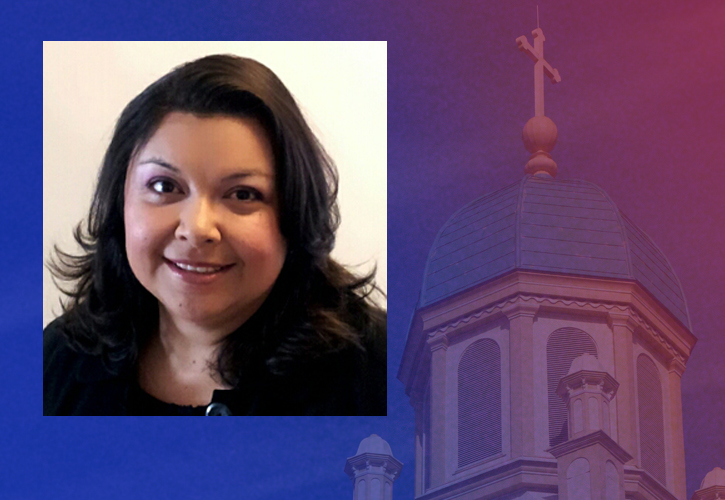College of Arts and Sciences Newsroom

Religion and Human Rights
The University of Dayton will connect with the fastest growing segment of the U.S. Catholic Church next month when it hosts the annual meeting of the Academy of Catholic Hispanic Theologians of the United States (ACHTUS).
The U.S. Catholic Church is becoming increasingly diverse as a result of immigration from predominantly Catholic countries in Latin America, with new and younger populations settling in the Southwest.
In the U.S., more than one-third of Catholics, or 36 percent, identify as Hispanic, according to a 2017 report published by the nonprofit, nonpartisan Public Religion Research Institute. A majority of U.S. Catholics under age 30, or 52 percent, are Hispanic. In addition, 54 percent of U.S. Catholics now live in the South and West.
“For a Catholic university that’s in the Midwest and doesn’t necessarily see this large population daily, it’s a huge event for UD to be able to host the association and have that thought happen here,” said Neomi De Anda, associate professor of religious studies and ACHTUS president-elect.
ACHTUS’ 30th annual colloquium — Together en La Lucha: Seeking Justice Through Religion and Human Rights? — is June 2-5 on campus. About 40 Catholic Hispanic religious scholars from the U.S. and abroad are expected to attend.
De Anda, a Catholic Lay Marianist, will be installed as ACHTUS’s fifth consecutive woman president during the meeting. She selected the theme of this year’s colloquium to highlight the University’s commitment to human rights, which includes establishing the nation’s first undergraduate human rights studies program in 1998 and launching the Human Rights Center in 2013.
“The focus of the colloquium is to think much more about Latino/Latina populations and human rights, and how we talk about and attend to human rights, and the history of human rights and Catholicism,” De Anda said.
The study of Catholicism in different American contexts is a focus of the University’s Department of Religious Studies, said Dan Thompson, associate professor and department chair.
“Dr. De Anda brings to the department and University a scholarly expertise on the most important context for the present and future of Catholicism in the U.S.A.: the diverse Latino/Latina Catholic population,” Thompson said. “As president of ACHTUS, she will offer this expertise as a public voice for Latino/Latina communities of theologians, who in turn dedicate their efforts to theological reflection on the experience of Latin American Catholics.
“Hosting the ACHTUS meeting at UD places the University in direct connections with this important group of Catholic thinkers and as a participant in this critical conversation about the Catholic Church in the United States.”
Each of the colloquium’s four sessions will include two paper presentations. The authors, who submitted their papers in advance, will receive feedback that they can then use to prepare them for publication in the Journal of Hispanic/Latino Theology, or to broaden them for use in larger research projects.
Topics include the Doctrine of Discovery, which established a spiritual, political and legal justification for colonization and seizure of land not inhabited by Christians. Invoked since Pope Alexander VI issued the Papal Bull Inter Caetera in 1493, it became the basis of all European claims in the Americas, as well as the foundation for the U.S.’s westward expansion.
Other sessions will address borders, labor issues and social movements — including the Chicano civil rights movement of the 1960s, which sought to empower Mexican-Americans.
“My presidential address will also focus on the theme of human rights,” De Anda said. “It will have a relationship to Mary, as well, and how we can use Mary as a model or how Mary has been seen historically and what could be understood in working toward the dignity of the human person and understandings around human rights.”
ACHTUS members will have the opportunity to visit the University’s Marian Library, which is recognized both nationally and internationally as a center for scholarship on the Blessed Virgin Mary.
University President Eric F. Spina, Provost Paul Benson and former president Brother Raymond Fitz, S.M., the Father Ferree Professor of Social Justice, will welcome colloquium attendees at various points throughout the event.
Posters featuring ACHTUS members’ photos and quotes were created by 2019 graduate Brandi Letsche and will be displayed across campus. A song created by junior Grady Bajorek and posters of wisdom sayings and puns created by 2019 graduate Merani Cosme for De Anda’s Latina/Latino religious experiences course also will be highlighted during the event.
Faculty, staff and students from the University’s Human Rights Center, Institute for Pastoral Initiatives and Department of Religious Studies were invited to attend the colloquium at a reduced rate, made possible by the Office of the Provost.
ACHTUS is an association of scholars dedicated to promoting research and critical theological reflection within the context of the U.S. Hispanic experience. Active membership is open to Roman Catholic Hispanics who possess a doctoral degree in theology, Scripture, ministry or general religious studies, and are knowledgeable and actively engaged in the North American Hispanic religious experience.
For more information, please visit the ACHTUS colloquium website.
- Dave Larsen, communication coordinator, College of Arts and Sciences
